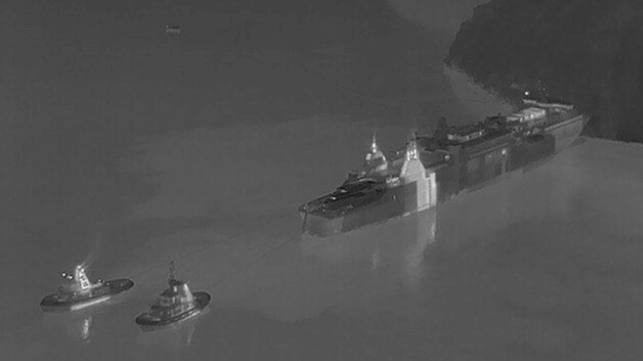Salvors Refloat Grounded Ferry off New Zealand's South Island

On Saturday night, salvors refloated the Interislander ferry Aratere, which went hard aground in Titoki Bay, New Zealand on Friday.
The 18,000 GT ferry departed Picton on Friday evening on a normally scheduled run, its fourth and final transit of the day. At about 2145 hours, about half an hour after leaving her berth, Aratere went aground at a position about 1.5 nautical miles to the north of Picton in Titoko Bay. No flooding or pollution were reported, and the 39 crewmembers and a team of eight professional divers on board were unharmed. They spent the night aboard the ship, according to local media.
A dive inspection confirmed that the vessel was safe to refloat. Since the bow was aground, ballast and cargo were shifted aft to trim the vessel by the stern. With the assistance of the tide and with two tugboats from Port Marlborough, salvors refloated Aratere without undue difficulty on Saturday night.
The local council will carry out environmental surveys of the grounding site to evaluate the extent of any damage to marine habitat, if any, Marlborough mayor Nadine Taylor said.
On the ferry's return to the port of Picton, the Aratere was detained by Maritime NZ for an inspection. The agency plans to work with operator KiwiRail and the vessel's class society to determine how the vessel lost steerage. The investigation will include interviews with the crew, an evaluation of the ship's records, and a thorough physical inspection.
"We will then decide what, if any, further action to take. The investigation is expected to take several months to complete," Maritime NZ said in a statement.
KiwiRail has not yet given a timeline for the ship's expected return to service. The operator and the ferry have a troubled record with maintenance, but have been making an effort to improve.
"We are working with urgency to understand what has happened here," said CEO Peter Reidy in a statement. "This is an incredibly unfortunate incident, especially coming after an intensive investment in an enhanced maintenance regime, supported by global asset management peer reviews during 2023 and 2024. Since then, we've had a solid run with reliability and on time performance and have generally been pleased with how our ships are performing."
The Aratere has a long history of breakdowns, beginning with her delivery voyage and running up through the present day. Like the rest of KiwiRail's three-ship ferry fleet, Aratere is nearing the end of her useful life; the firm has been trying to replace the vessels since 2021, but has had difficulty in gaining consistent government support for a procurement program. In the meantime, the firm's current vessels continue to operate across the Cook Strait - with varying results.
Maritime NZ's enforcement arm is currently prosecuting KiwiRail over a previous technical breakdown. The Kaitaki, another of KiwiRail's vessels, lost power in 2023 near Wellington. With a load of cargo and passengers on board, the vessel drifted towards the rocks at Sinclair Head. Luckily, the crew managed to prevent disaster by dropping anchor.
The root cause was a failed rubber expansion joint in one of Kaitaki's cooling lines. A post-accident investigation determined that the component was manufactured in 2005, and had been installed in the vessel after 13 years in storage. At the time of its failure in 2023, it was 18 years old, long past the OEM's rated timeline for replacement. Two other expansion joints were also past-date, suggesting a pattern of installing aged equipment from the warehouse. New Zealand's Transport Accident Investigation Commission (TAIC) concluded that the company had failed to track the parts and follow recommendations.
In an interview with the New Zealand Herald, Transport Minister Simeon Brown called the grounding "incredibly concerning," and said that he was "deeply disappointed" with the state of maintenance at KiwiRail.

that matters most
Get the latest maritime news delivered to your inbox daily.
"The Government is committed to making the investment required to support resilience shipping across the strait, including new ships," said Brown. "But we also have to get the right ships for the job, and KiwiRail must maintain its existing ships to the safe standard required.”
Newly-appointed Finance Minister Nicola Willis canceled KiwiRail's newbuild fleet replacement plans last December for budgetary reasons, calling the NZ$3 billion acquisition plan a "Ferrari" option. Contracts were already in place and design work was under way at the time of the cancelation. The new vessels would have delivered in 2026.
